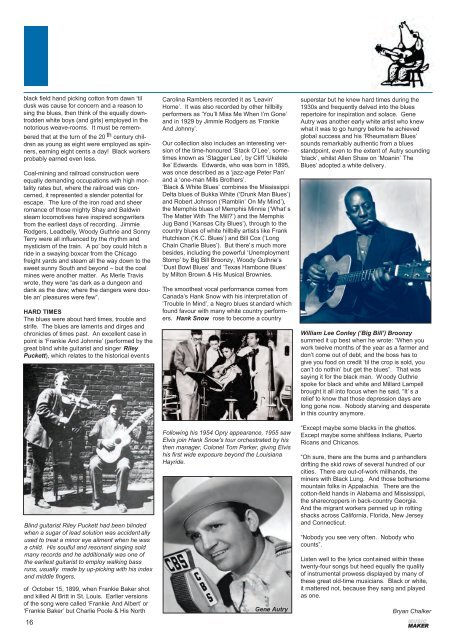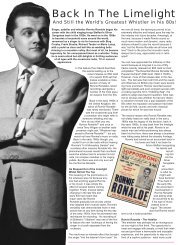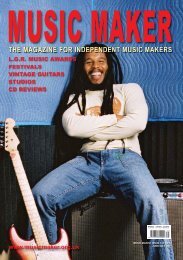the magazine for independent music makers - The Music Maker Guide
the magazine for independent music makers - The Music Maker Guide
the magazine for independent music makers - The Music Maker Guide
Create successful ePaper yourself
Turn your PDF publications into a flip-book with our unique Google optimized e-Paper software.
lack field hand picking cotton from dawn ‘til<br />
dusk was cause <strong>for</strong> concern and a reason to<br />
sing <strong>the</strong> blues, <strong>the</strong>n think of <strong>the</strong> equally downtrodden<br />
white boys (and girls) employed in <strong>the</strong><br />
notorious weave-rooms. It must be remembered<br />
that at <strong>the</strong> turn of <strong>the</strong> 20 th century children<br />
as young as eight were employed as spinners,<br />
earning eight cents a day! Black workers<br />
probably earned even less.<br />
Coal-mining and railroad construction were<br />
equally demanding occupations with high mortality<br />
rates but, where <strong>the</strong> railroad was concerned,<br />
it represented a slender potential <strong>for</strong><br />
escape. <strong>The</strong> lure of <strong>the</strong> iron road and sheer<br />
romance of those mighty Shay and Baldwin<br />
steam locomotives have inspired songwriters<br />
from <strong>the</strong> earliest days of recording. Jimmie<br />
Rodgers, Leadbelly, Woody Guthrie and Sonny<br />
Terry were all influenced by <strong>the</strong> rhythm and<br />
mysticism of <strong>the</strong> train. A po’ boy could hitch a<br />
ride in a swaying boxcar from <strong>the</strong> Chicago<br />
freight yards and steam all <strong>the</strong> way down to <strong>the</strong><br />
sweet sunny South and beyond – but <strong>the</strong> coal<br />
mines were ano<strong>the</strong>r matter. As Merle Travis<br />
wrote, <strong>the</strong>y were “as dark as a dungeon and<br />
dank as <strong>the</strong> dew; where <strong>the</strong> dangers were double<br />
an’ pleasures were few”.<br />
HARD TIMES<br />
<strong>The</strong> blues were about hard times, trouble and<br />
strife. <strong>The</strong> blues are laments and dirges and<br />
chronicles of times past. An excellent case in<br />
point is ‘Frankie And Johnnie’ (per<strong>for</strong>med by <strong>the</strong><br />
great blind white guitarist and singer Riley<br />
Puckett), which relates to <strong>the</strong> historical event s<br />
Blind guitarist Riley Puckett had been blinded<br />
when a sugar of lead solution was accident ally<br />
used to treat a minor eye ailment when he was<br />
a child. His soulful and resonant singing sold<br />
many records and he additionally was one of<br />
<strong>the</strong> earliest guitarist to employ walking bass<br />
runs, usually made by up-picking with his index<br />
and middle fingers.<br />
of October 15, 1899, when Frankie Baker shot<br />
and killed Al Britt in St. Louis. Earlier versions<br />
of <strong>the</strong> song were called ‘Frankie And Albert’ or<br />
‘Frankie Baker’ but Charlie Poole & His North<br />
16<br />
Carolina Ramblers recorded it as ‘Leavin’<br />
Home’. It was also recorded by o<strong>the</strong>r hillbilly<br />
per<strong>for</strong>mers as ‘You’ll Miss Me When I’m Gone’<br />
and in 1929 by Jimmie Rodgers as ‘Frankie<br />
And Johnny’.<br />
Our collection also includes an interesting version<br />
of <strong>the</strong> time-honoured ‘Stack O’Lee’, sometimes<br />
known as ‘Stagger Lee’, by Cliff ‘Ukelele<br />
Ike’ Edwards. Edwards, who was born in 1895,<br />
was once described as a ‘jazz-age Peter Pan’<br />
and a ‘one-man Mills Bro<strong>the</strong>rs’.<br />
‘Black & White Blues’ combines <strong>the</strong> Mississippi<br />
Delta blues of Bukka White (‘Drunk Man Blues’)<br />
and Robert Johnson (‘Ramblin’ On My Mind’),<br />
<strong>the</strong> Memphis blues of Memphis Minnie (‘What’ s<br />
<strong>The</strong> Matter With <strong>The</strong> Mill?’) and <strong>the</strong> Memphis<br />
Jug Band (‘Kansas City Blues’), through to <strong>the</strong><br />
country blues of white hillbilly artists like Frank<br />
Hutchison (‘K.C. Blues’) and Bill Cox (‘Long<br />
Chain Charlie Blues’). But <strong>the</strong>re’s much more<br />
besides, including <strong>the</strong> powerful ‘Unemployment<br />
Stomp’ by Big Bill Broonzy, Woody Guthrie’s<br />
‘Dust Bowl Blues’ and ‘Texas Hambone Blues’<br />
by Milton Brown & His <strong>Music</strong>al Brownies.<br />
<strong>The</strong> smoo<strong>the</strong>st vocal per<strong>for</strong>mance comes from<br />
Canada’s Hank Snow with his interpretation of<br />
‘Trouble In Mind’, a Negro blues st andard which<br />
found favour with many white country per<strong>for</strong>mers.<br />
Hank Snow rose to become a country<br />
Following his 1954 Opry appearance, 1955 saw<br />
Elvis join Hank Snow's tour orchestrated by his<br />
<strong>the</strong>n manager, Colonel Tom Parker, giving Elvis<br />
his first wide exposure beyond <strong>the</strong> Louisiana<br />
Hayride.<br />
superstar but he knew hard times during <strong>the</strong><br />
1930s and frequently delved into <strong>the</strong> blues<br />
repertoire <strong>for</strong> inspiration and solace. Gene<br />
Autry was ano<strong>the</strong>r early white artist who knew<br />
what it was to go hungry be<strong>for</strong>e he achieved<br />
global success and his ‘Rheumatism Blues’<br />
sounds remarkably au<strong>the</strong>ntic from a blues<br />
standpoint, even to <strong>the</strong> extent of Autry sounding<br />
‘black’, whilst Allen Shaw on ‘Moanin’ <strong>The</strong><br />
Blues’ adopted a white delivery.<br />
William Lee Conley (‘Big Bill’) Broonzy<br />
summed it up best when he wrote: “When you<br />
work twelve months of <strong>the</strong> year as a farmer and<br />
don’t come out of debt, and <strong>the</strong> boss has to<br />
give you food on credit ‘til <strong>the</strong> crop is sold, you<br />
can’t do nothin’ but get <strong>the</strong> blues”. That was<br />
saying it <strong>for</strong> <strong>the</strong> black man. W oody Guthrie<br />
spoke <strong>for</strong> black and white and Millard Lampell<br />
brought it all into focus when he said, “It’ s a<br />
relief to know that those depression days are<br />
long gone now. Nobody starving and desperate<br />
in this country anymore.<br />
“Except maybe some blacks in <strong>the</strong> ghettos.<br />
Except maybe some shiftless Indians, Puerto<br />
Ricans and Chicanos.<br />
“Oh sure, <strong>the</strong>re are <strong>the</strong> bums and p anhandlers<br />
drifting <strong>the</strong> skid rows of several hundred of our<br />
cities. <strong>The</strong>re are out-of-work millhands, <strong>the</strong><br />
miners with Black Lung. And those bo<strong>the</strong>rsome<br />
mountain folks in Appalachia. <strong>The</strong>re are <strong>the</strong><br />
cotton-field hands in Alabama and Mississippi,<br />
<strong>the</strong> sharecroppers in back-country Georgia.<br />
And <strong>the</strong> migrant workers penned up in rotting<br />
shacks across Cali<strong>for</strong>nia, Florida, New Jersey<br />
and Connecticut.<br />
“Nobody you see very often. Nobody who<br />
counts”.<br />
Listen well to <strong>the</strong> lyrics contained within <strong>the</strong>se<br />
twenty-four songs but heed equally <strong>the</strong> quality<br />
of instrumental prowess displayed by many of<br />
<strong>the</strong>se great old-time <strong>music</strong>ians. Black or white,<br />
it mattered not, because <strong>the</strong>y sang and played<br />
as one.<br />
Gene Autry Bryan Chalker<br />
MUSIC<br />
MAKER





